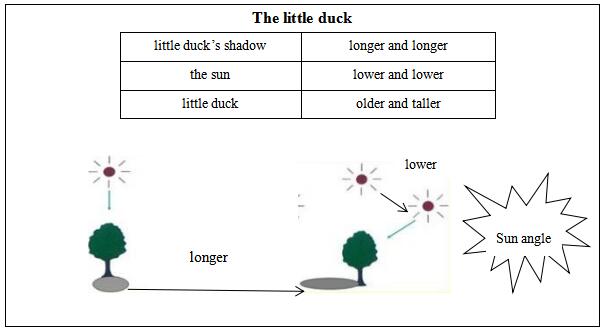小学英语《How tall are you?》教案
教师资格证考试报名有疑问、当地政策不了解,点击立即报考咨询》》
Teaching Aims
Knowledge aims
1. Students can master the meaning about the comparative degree of some words “taller”, “longer”, and “lower”.
2. Students can get the main idea of the reading material.
Ability aims
1. Students can exercise and improve their reading ability, including scanning and skimming.
2.Students will be able to predict their changes in the future.
Emotional aims
1. Students can be interested in learning English and science.
2. Students can understand the scientific reason for the shadow’s change with the help of the science teacher.
Teaching Key &Difficult Points
Key points:
Students can master the comparative degree of the adjective words.
Students can understand the meaning of the passage and know the scientific explanation about the little duck’s shadow.
Difficult points:
Students can exercise and improve their ability of reading, including scanning and skimming.
Students can improve their interest of learning English and cultivate the spirit of science.
Teaching procedures
Step 1: Warming up
1. Daily greeting.
2. Guess a riddle with students together.
I can swim.
My body’s color is yellow.
I can say quack, quack, quack.
Who am I?
Ask them the answer of the riddle, and they may say “duck”. Then tell them that today we are going to learn the story of a little duck.
Step 2: Pre-reading
Show some pictures about the shadows of the tree in the morning, afternoon and evening. Ask them the difference among the shadows in the picture. Then ask students to predict the topic in today’s reading. And students may answer the topic is the shadow and a little duck. And then start reading and check students’ predictions.
Step 3: While-reading
1. Global reading
Ask students to open their books and read the whole passage quickly for the first time. Show them two questions. The first question: “What do you think is the proper title, the little duck’s shadow or the old tree’s shadow?” The second question: “What kinds of things are mentioned in the passage?” 3 minutes will be given. After reading, students may answer the right title and they may tell the teacher there is a little duck, an old tree, the sun and shadow in the passage.
2. Detailed reading
Ask students to read for the second time. Ask them what changes happen to the little duck, sun and little duck’s shadow. Then finish the chart. Ask students why the little duck’s shadow changes. 6 minutes will be given. Then teacher invites one student to finish the chart on the blackboard and explain the comparative degree. Teacher will play a video of the science teacher to explain the reason why the little duck’s shadow becomes longer is because the sun angle changes.
Step 4: Post-reading
Ask students to make a discussion to predict their changes in the future. 5 minutes will be given. Then invite some students to share their ideas and give encouragement.
Step 5: Summary & Homework
Summary: invite one of the students to summarize and others make a supplement together.
Homework: ask students to observe the shadow’s change in different time and make a record with timeline. Share their findings next class.
Blackboard design

Teaching Reflection
-
《普通话》精讲班教材精讲班765人已预约立即预约2022-04-15 15:05:03
-
幼儿教师临考速成班钻石无忧班801人已预约立即预约2022-04-15 15:05:29
-
小学教师临考速成班教材精讲班834人已预约立即预约2022-04-15 15:21:42
-
中学教师临考速成班教材精讲班795人已预约立即预约2022-04-15 15:24:05
-
中学考前救命大法专题班教材精讲班807人已预约立即预约2022-04-15 15:31:55
-
小学考前救命大法专题班教材精讲班915人已预约立即预约2022-04-15 15:32:37
-
幼师考前救命大法专题班教材精讲班761人已预约立即预约2022-04-16 15:33:36










